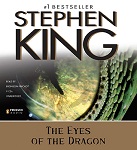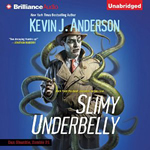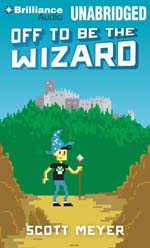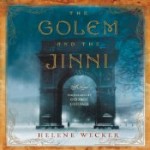
 The Eyes of the Dragon
The Eyes of the Dragon
By Stephen King; Read by Bronson Pinchot
11 Hours – [UNABRIDGED]
Publisher: Penguin Audio
Published: 2010
Themes: / Fantasy / Good and evil / Magic / Monarchy / Wizards /
After writing his magnum opus IT, Stephen King briefly stepped away from the genre that defined his career. The result was The Eyes of the Dragon (1987), a fantasy novel. King said that he wrote The Eyes of the Dragon for his daughter Naomi (for whom the book is dedicated, along with King’s friend Ben Straub) who reportedly never liked her father’s terrifying tales.
While that may be true, I also think that King may have thought he had said all that he had to say about horror and was looking to explore other genres. He may also have simply exhausted himself with the tome-like IT and needed to try his hand at something short and simple. Compared with most King novels, The Eyes of the Dragon is a chapbook (it’s nine compact discs in the Penguin Audio version, 380 pages in paperback including illustrations).
In brief, The Eyes of the Dragon is a story about the inheritance of the kingship of the fictional realm of Delain. Roland, the old king, fathers two sons late in life, Peter and Thomas. Peter, the eldest, is slated to inherit the throne. Peter possesses all the qualities you would want in a monarch—he’s smart, just, honest, and brave. Thomas on the other hand is a near clone of his father—an average thinker, prone to vacillations, reluctant to make important decisions. Roland’s adviser is Flagg, a shadowy wizard who has served the kings of Delain for centuries, perhaps longer. Flagg is actually a demonic figure who wants to see Delain in ruins and the world thrown into a dark age of bloody anarchy. He devises a plot to poison Roland, framing the murder so that the blame falls on Peter. When the dust settles, Thomas, only 12 years old, unfit to rule and terrified with his new responsibility, is put on the throne. Flagg knows that Thomas will be a puppet in his hands and the instrument through which he can finally see his centuries-long evil plans come to fruition. Peter is sentenced to life in a prison in the tower of the Needle, a small cell high above the city.
King has professed a love for the writings of J.R.R. Tolkien (The Stand is a semi-homage to The Lord of the Rings, and The Dark Tower series draws its inspiration from that book as well). The Eyes of the Dragon shares a lot in common with The Hobbit. Roland’s ancient heirloom is the arrow Foe-Hammer, one of the names given to Gandalf’s sword Glamdring. It’s also an allusion to the black arrow Bard uses to bring down the dragon Smaug. King tells the tale using an omniscient narrator who speaks with a pleasant, conversational voice, and seems to be relaying the tale years later and from some other time and place. This authorial voice is another hallmark of The Hobbit, written initially for Tolkien’s children and meant to be read aloud.
In general I liked The Eyes of the Dragon very much. As with all of King’s stories it’s wonderfully told with a compelling narrative. It feels like a fairy tale with an edge, in which the events will likely work out for the good in the end but with blood spilled and hearts broken along the way.
Peter is a great character and is easy to root for. Despite his unjust sentence and the fact that he knows he will likely never leave the Needle alive, he refuses to succumb to despair. Peter is a born leader with a carriage of command. Guards who initially spit in his soup or try to bully him, believing that as a convicted murderer he will be humbled and easy prey, are cowed by his regal bearing. His captors begin to question whether he indeed murdered his father. Peter has truth on his side and maintains his innocence with a quiet certitude that inspires awe. After his first week in the Needle he makes up his mind to live, and to not relinquish his kingship. Though he’s been convicted and stripped of his regalia and title he is in all respects still the uncrowned King of Delain.
If you’re a fan of King’s world and works you’ll recognize the name of Flagg, who is also the main villain of The Stand and The Dark Tower. While menacing in The Eyes of the Dragon, I found Flagg not as terrifying as he is portrayed in The Stand. Perhaps it’s because he’s less mysterious here and more of a prototypical evil dark wizard. He only reaches the truly insane level of depravity and malice I came to associate with Flagg of The Stand at the very end of the novel.
The Eyes of the Dragon is a moral tale and uses the fantasy trope of pitting opposing sides of good and evil against each other (Peter is almost stainlessly pure, while Flagg is an unredeemable monster who wants to see Delain thrown into a 1,000-year reign of anarchy and blood-soaked chaos). In between are characters with shades of gray, and just like The Lord of the Rings the outcome is decided by a few average folk who have to make difficult choices that run at odds with their own best interests.
But The Eyes of the Dragon is not without a few flaws. In my opinion King is far more comfortable and convincing when he’s writing about our world and in particular his Maine birthplace. Fictional small towns like Derry and Castle Rock feel real because King knows their environs and peoples. In contrast, the kingdom of Delain is unremarkable and without character (it’s a typical monarchy with kings and a servant class, whose technology is roughly high medieval). Any truly fantastic elements are at a minimum: Flagg is the only person who has access to magic and his spells are more alchemy than spellcraft. The only monster we see is a single smallish dragon in a flashback sequence whose head is mounted on the wall of Roland’s sitting room (from this trophy we get the title of the novel).
There are some holes in the plot, too. For someone who is incredibly ancient, powerful, and brilliantly evil, how does Flagg let Peter live for more than five years, letting him patiently spin his escape plot from the top of the Needle? Flagg recognizes Peter almost from birth as a formidable threat: Why wouldn’t he poison him, or pay the guards to murder him, or simply do it himself? When Flagg finally does catch on to Peter’s escape plan and comes racing up the stairs of the Needle swinging his monstrous double-bladed axe like a medieval version of Jack Torrance, I wondered why he had chosen to wait so long.
The second plot hole is Peter’s method of escape. I won’t spoil it here, but it seemed unrealistic that one of the omnipresent guards (who frequently pop their heads into the window on Peter’s cell door) wouldn’t have caught him in the act at some point during his five-plus years of imprisonment.
Still, a few problems aside, The Eyes of the Dragon is, like most of King’s material, a great read and highly recommended. Bronson Pinchot does a wonderful job as narrator and in particular delivers a wonderfully-voiced Flagg, delivering his lines with a whispering malice.
Posted by Brian Murphy

 Slimy Underbelly (Dan Shamble, Zombie P.I., Book 4)
Slimy Underbelly (Dan Shamble, Zombie P.I., Book 4) Off to Be the Wizard (Magic 2.0 #1)
Off to Be the Wizard (Magic 2.0 #1)




 A Wizard of Earthsea
A Wizard of Earthsea